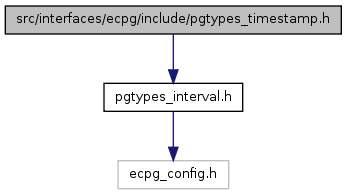#include <pgtypes_interval.h>

Go to the source code of this file.
Typedefs | |
| typedef double | timestamp |
| typedef double | TimestampTz |
Functions | |
| timestamp | PGTYPEStimestamp_from_asc (char *, char **) |
| char * | PGTYPEStimestamp_to_asc (timestamp) |
| int | PGTYPEStimestamp_sub (timestamp *, timestamp *, interval *) |
| int | PGTYPEStimestamp_fmt_asc (timestamp *, char *, int, const char *) |
| void | PGTYPEStimestamp_current (timestamp *) |
| int | PGTYPEStimestamp_defmt_asc (char *, const char *, timestamp *) |
| int | PGTYPEStimestamp_add_interval (timestamp *tin, interval *span, timestamp *tout) |
| int | PGTYPEStimestamp_sub_interval (timestamp *tin, interval *span, timestamp *tout) |
| typedef double timestamp |
Definition at line 13 of file pgtypes_timestamp.h.
| typedef double TimestampTz |
Definition at line 14 of file pgtypes_timestamp.h.
Definition at line 949 of file timestamp.c.
References day_tab, isleap, interval::month, MONTHS_PER_YEAR, NULL, interval::time, timestamp2tm(), TIMESTAMP_NOT_FINITE, tm, tm2timestamp(), and pg_tm::tm_mon.
Referenced by main(), and PGTYPEStimestamp_sub_interval().
{
if (TIMESTAMP_NOT_FINITE(*tin))
*tout = *tin;
else
{
if (span->month != 0)
{
struct tm tt,
*tm = &tt;
fsec_t fsec;
if (timestamp2tm(*tin, NULL, tm, &fsec, NULL) != 0)
return -1;
tm->tm_mon += span->month;
if (tm->tm_mon > MONTHS_PER_YEAR)
{
tm->tm_year += (tm->tm_mon - 1) / MONTHS_PER_YEAR;
tm->tm_mon = (tm->tm_mon - 1) % MONTHS_PER_YEAR + 1;
}
else if (tm->tm_mon < 1)
{
tm->tm_year += tm->tm_mon / MONTHS_PER_YEAR - 1;
tm->tm_mon = tm->tm_mon % MONTHS_PER_YEAR + MONTHS_PER_YEAR;
}
/* adjust for end of month boundary problems... */
if (tm->tm_mday > day_tab[isleap(tm->tm_year)][tm->tm_mon - 1])
tm->tm_mday = (day_tab[isleap(tm->tm_year)][tm->tm_mon - 1]);
if (tm2timestamp(tm, fsec, NULL, tin) != 0)
return -1;
}
*tin += span->time;
*tout = *tin;
}
return 0;
}
| void PGTYPEStimestamp_current | ( | timestamp * | ) |
Definition at line 375 of file timestamp.c.
References GetCurrentDateTime(), NULL, tm, and tm2timestamp().
Referenced by dtcurrent(), and main().
{
struct tm tm;
GetCurrentDateTime(&tm);
if (errno == 0)
tm2timestamp(&tm, 0, NULL, ts);
return;
}
| int PGTYPEStimestamp_defmt_asc | ( | char * | , | |
| const char * | , | |||
| timestamp * | ||||
| ) |
Definition at line 897 of file timestamp.c.
References free, i, pgtypes_strdup(), and PGTYPEStimestamp_defmt_scan().
Referenced by dtcvfmtasc(), and main().
{
int year,
month,
day;
int hour,
minute,
second;
int tz;
int i;
char *mstr;
char *mfmt;
if (!fmt)
fmt = "%Y-%m-%d %H:%M:%S";
if (!fmt[0])
return 1;
mstr = pgtypes_strdup(str);
mfmt = pgtypes_strdup(fmt);
/*
* initialize with impossible values so that we can see if the fields
* where specified at all
*/
/* XXX ambiguity with 1 BC for year? */
year = -1;
month = -1;
day = -1;
hour = 0;
minute = -1;
second = -1;
tz = 0;
i = PGTYPEStimestamp_defmt_scan(&mstr, mfmt, d, &year, &month, &day, &hour, &minute, &second, &tz);
free(mstr);
free(mfmt);
return i;
}
| int PGTYPEStimestamp_fmt_asc | ( | timestamp * | , | |
| char * | , | |||
| int | , | |||
| const char * | ||||
| ) |
Definition at line 869 of file timestamp.c.
References dttofmtasc_replace(), NULL, PGTYPESdate_dayofweek(), PGTYPESdate_from_timestamp(), timestamp2tm(), and tm.
Referenced by dttofmtasc(), and main().
{
struct tm tm;
fsec_t fsec;
date dDate;
int dow;
dDate = PGTYPESdate_from_timestamp(*ts);
dow = PGTYPESdate_dayofweek(dDate);
timestamp2tm(*ts, NULL, &tm, &fsec, NULL);
return dttofmtasc_replace(ts, dDate, dow, &tm, output, &str_len, fmtstr);
}
| timestamp PGTYPEStimestamp_from_asc | ( | char * | , | |
| char ** | ||||
| ) |
Definition at line 278 of file timestamp.c.
References DecodeDateTime(), DTK_DATE, DTK_EARLY, DTK_EPOCH, DTK_INVALID, DTK_LATE, MAXDATELEN, NULL, ParseDateTime(), SetEpochTimestamp(), TIMESTAMP_NOBEGIN, TIMESTAMP_NOEND, tm, and tm2timestamp().
Referenced by dtcvasc(), ecpg_get_data(), and main().
{
timestamp result;
#ifdef HAVE_INT64_TIMESTAMP
int64 noresult = 0;
#else
double noresult = 0.0;
#endif
fsec_t fsec;
struct tm tt,
*tm = &tt;
int dtype;
int nf;
char *field[MAXDATEFIELDS];
int ftype[MAXDATEFIELDS];
char lowstr[MAXDATELEN + MAXDATEFIELDS];
char *realptr;
char **ptr = (endptr != NULL) ? endptr : &realptr;
if (strlen(str) >= sizeof(lowstr))
{
errno = PGTYPES_TS_BAD_TIMESTAMP;
return (noresult);
}
if (ParseDateTime(str, lowstr, field, ftype, &nf, ptr) != 0 ||
DecodeDateTime(field, ftype, nf, &dtype, tm, &fsec, 0) != 0)
{
errno = PGTYPES_TS_BAD_TIMESTAMP;
return (noresult);
}
switch (dtype)
{
case DTK_DATE:
if (tm2timestamp(tm, fsec, NULL, &result) != 0)
{
errno = PGTYPES_TS_BAD_TIMESTAMP;
return (noresult);
}
break;
case DTK_EPOCH:
result = SetEpochTimestamp();
break;
case DTK_LATE:
TIMESTAMP_NOEND(result);
break;
case DTK_EARLY:
TIMESTAMP_NOBEGIN(result);
break;
case DTK_INVALID:
errno = PGTYPES_TS_BAD_TIMESTAMP;
return (noresult);
default:
errno = PGTYPES_TS_BAD_TIMESTAMP;
return (noresult);
}
/* AdjustTimestampForTypmod(&result, typmod); */
/*
* Since it's difficult to test for noresult, make sure errno is 0 if no
* error occurred.
*/
errno = 0;
return result;
}
Definition at line 884 of file timestamp.c.
References interval::month, interval::time, and TIMESTAMP_NOT_FINITE.
Referenced by dtsub().
{
if (TIMESTAMP_NOT_FINITE(*ts1) || TIMESTAMP_NOT_FINITE(*ts2))
return PGTYPES_TS_ERR_EINFTIME;
else
iv->time = (*ts1 - *ts2);
iv->month = 0;
return 0;
}
Definition at line 1010 of file timestamp.c.
References interval::month, PGTYPEStimestamp_add_interval(), and interval::time.
| char* PGTYPEStimestamp_to_asc | ( | timestamp | ) |
Definition at line 353 of file timestamp.c.
References buf, DateStyle, EncodeDateTime(), EncodeSpecialTimestamp(), MAXDATELEN, NULL, pgtypes_strdup(), timestamp2tm(), TIMESTAMP_NOT_FINITE, and tm.
Referenced by dttoasc(), ecpg_store_input(), and main().
{
struct tm tt,
*tm = &tt;
char buf[MAXDATELEN + 1];
fsec_t fsec;
int DateStyle = 1; /* this defaults to ISO_DATES, shall we make
* it an option? */
if (TIMESTAMP_NOT_FINITE(tstamp))
EncodeSpecialTimestamp(tstamp, buf);
else if (timestamp2tm(tstamp, NULL, tm, &fsec, NULL) == 0)
EncodeDateTime(tm, fsec, false, 0, NULL, DateStyle, buf, 0);
else
{
errno = PGTYPES_TS_BAD_TIMESTAMP;
return NULL;
}
return pgtypes_strdup(buf);
}
 1.7.1
1.7.1